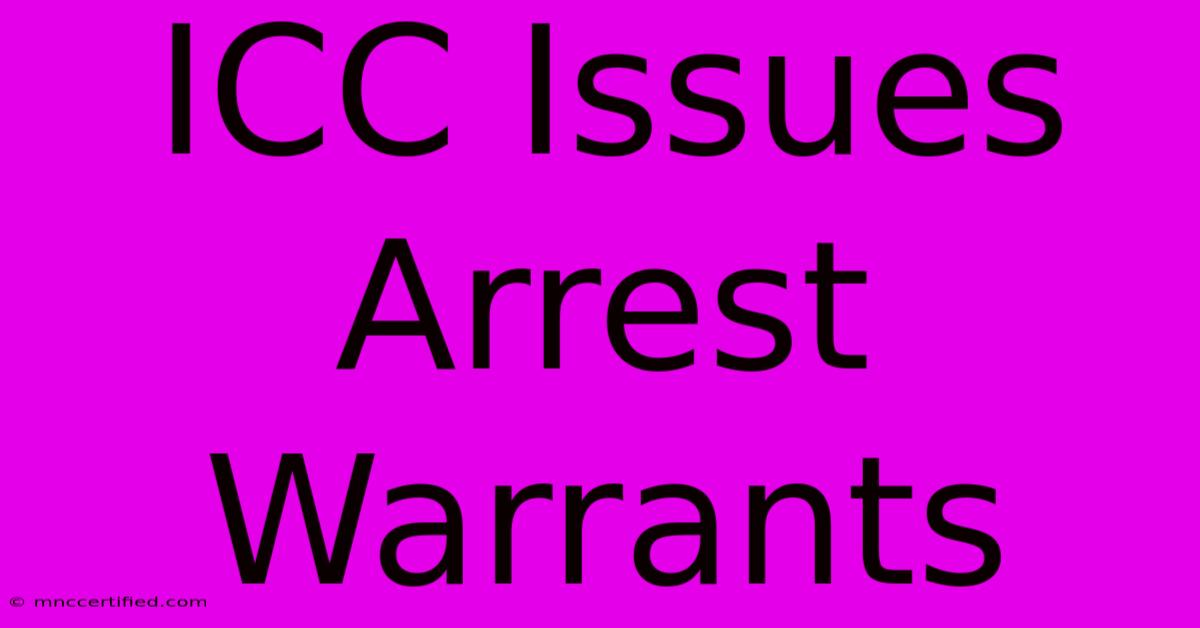ICC Issues Arrest Warrants

Table of Contents
ICC Issues Arrest Warrants: Understanding the Implications
The International Criminal Court (ICC) recently issued arrest warrants, sparking international debate and raising crucial questions about international law, sovereignty, and the pursuit of justice. This article delves into the specifics of these warrants, their implications, and the broader context of the ICC's role in addressing international crimes.
Understanding the ICC's Jurisdiction
The International Criminal Court is an independent intergovernmental organization established to investigate and prosecute individuals accused of the most serious crimes of international concern, including:
- Genocide: Acts committed with the intent to destroy, in whole or in part, a national, ethnical, racial, or religious group.
- Crimes against humanity: Widespread or systematic attacks against a civilian population.
- War crimes: Grave breaches of the Geneva Conventions and other serious violations of the laws and customs of war.
- The crime of aggression: The use of armed force by a State against the sovereignty, territorial integrity or political independence of another State.
It's crucial to understand that the ICC's jurisdiction is limited. It only prosecutes individuals, not states. Furthermore, a state must be a signatory to the Rome Statute, the treaty establishing the ICC, or have accepted the Court's jurisdiction in some other manner for the ICC to have jurisdiction over crimes committed on its territory or by its nationals. This often leads to complex political and legal maneuvering.
The Recent Arrest Warrants: Specifics and Context
(This section requires updating with the specifics of the most recent arrest warrants issued by the ICC. Replace the bracketed information below with accurate details from credible news sources. Include names, charges, and the countries involved.)
The ICC recently issued arrest warrants for [Name(s) of individual(s)], allegedly responsible for [Specific crimes, e.g., war crimes, crimes against humanity]. These warrants relate to events in [Country/Region] concerning [Brief description of the situation]. The charges are [List of charges]. The issuance of these warrants has [Describe the immediate reactions and implications – political fallout, international response, etc.].
Challenges and Criticisms of the ICC
The ICC's work is not without its challenges and criticisms. Common critiques include:
- Selectivity: Accusations of bias towards certain regions or actors.
- Sovereignty concerns: Some states argue that the ICC infringes upon their national sovereignty.
- Effectiveness: Questions regarding the ICC's ability to effectively bring perpetrators to justice, given the challenges of enforcement.
- Resource constraints: The ICC operates with limited resources, potentially hindering its investigations and prosecutions.
Addressing these criticisms requires open dialogue and a commitment to improving the ICC's processes and ensuring accountability.
The Implications of the Arrest Warrants
The issuance of arrest warrants by the ICC has far-reaching implications. These include:
- Legal ramifications: The potential for trials, convictions, and sentences for the accused.
- Political consequences: Strain on international relations, diplomatic fallout, and potential impacts on regional stability.
- Humanitarian considerations: The potential impact on victims and affected communities.
- International legal precedent: The setting of precedents for future cases and the strengthening of international criminal law.
The Road Ahead:
The ICC's role in upholding international justice remains a complex and constantly evolving issue. The recent arrest warrants highlight the ongoing struggle to balance national sovereignty with the need for accountability for grave international crimes. Further analysis of the situation, including the specific responses of involved nations and international organizations, is crucial to understanding the long-term consequences of these actions.
Keywords: ICC, International Criminal Court, arrest warrants, war crimes, crimes against humanity, genocide, international law, international justice, Rome Statute, sovereignty, accountability, [Names of individuals involved], [Country/Region involved].
Off-Page SEO Strategies:
- Promote the article on social media platforms using relevant hashtags.
- Engage in discussions on relevant online forums and communities.
- Build high-quality backlinks from reputable news websites and legal blogs.
- Submit the article to relevant online directories.
This article provides a comprehensive overview, but remember to update the specifics related to the most recent warrants issued by the ICC using current and verifiable information from reputable news sources. Always cite your sources appropriately.

Thank you for visiting our website wich cover about ICC Issues Arrest Warrants. We hope the information provided has been useful to you. Feel free to contact us if you have any questions or need further assistance. See you next time and dont miss to bookmark.
Featured Posts
-
Court Rejects Smollett Charges
Nov 22, 2024
-
Top Oura Ring Black Friday Sales
Nov 22, 2024
-
Pierss Reaction To Ellens Departure
Nov 22, 2024
-
Msi Insurance Credit Card Charge
Nov 22, 2024
-
Storm Bert Police Scotland Travel Advice
Nov 22, 2024